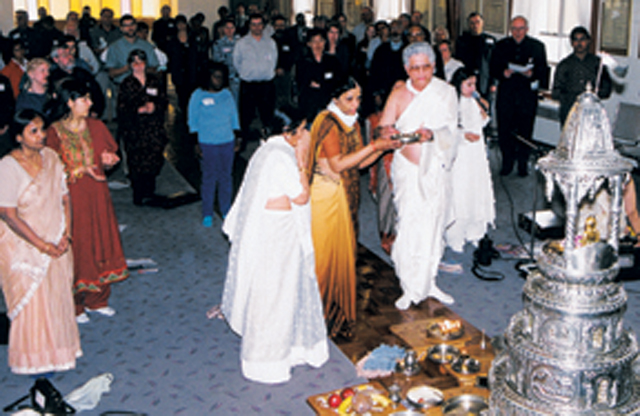DIALOGUE ON NONVIOLENCE
Learning from the Jains
By September 2001
Return to Table of Contents
Print Article
On March 11 of last year, a multifaith contingent of 150 people converged upon the only Jain temple in Toronto. This interfaith gathering was sponsored by Scarboro Missions and the Jain Society of Toronto. It featured a four-part program comprised of a Jain prayer service and vegetarian meal, an interfaith panel on nonviolence, and a walking tour of the Jain temple.
Nonviolence (ahimsa) is the spiritual and moral core of Jainism. This ancient religion of India possesses a radical belief in the sanctity of all living beings be they trees, elephants, humans or insects. The Jain belief in unconditional reverence for all living things translates into a number of admirable values including truthfulness, non-acquisitiveness and a commitment not to harm any creature, no matter how small.
Mahatma Gandhi was profoundly influenced by Jainism. He grew up in a part of India (Gujarat) that is permeated with Jain thought. In this region, Hinduism and Jainism co-exist peacefully and share many religious concepts. As Gandhi grew older, he adopted a number of lifestyle practices that reflect those of a Jain monk. Jains of today regard Mahatma Gandhi as the greatest modern interpreter of nonviolence.
The morning program at the Jain temple began with a colourful puja (prayer service) accompanied by a commentary in English explaining the meaning of each ritual.
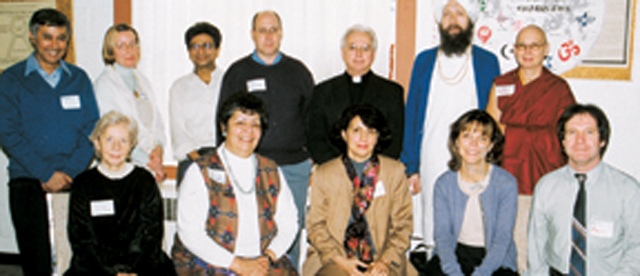 Interfaith panel and event organizers. (Front row (L-R) Irena Upenieks (Jaiinism), Frances Sanderson (Aboriginal), Atiya Ashan (Islam), Rosana Pellizzari (Christiainity), Paul McKenna (Scarboro Missions Interfaith Desk).
Interfaith panel and event organizers. (Front row (L-R) Irena Upenieks (Jaiinism), Frances Sanderson (Aboriginal), Atiya Ashan (Islam), Rosana Pellizzari (Christiainity), Paul McKenna (Scarboro Missions Interfaith Desk).(Back Row) Chander Khanna (Hinduism), Nancy Diinnigan-Prashad (Baha’i), Prakash Mody, (Jainism), Howard Bernstein (Judaism), Fr. Ray O’Toole (Scarboro Missions), Guru Fatha Singh Khalsa (Sikhism, Venerable Khikshuni Tenzin Kalsang (Buddhism).
After the puja, audience members were invited to pose questions about the service and about Jainism in general.
Next, the multifaith congregation was treated to a Jain vegetarian meal. All Jains are vegetarian. In fact, vegetarianism is an expression of their radical commitment to nonviolence. For Jains, the killing of animals for food, or for any other reason, is unacceptable.
The afternoon session featured speakers from eight faiths, each of whom commented on the place of nonviolence in his or her spiritual tradition.
The first panelist was Frances Sanderson, a Native person who helps other Aboriginal people find affordable housing in Toronto. She focused on some important connections between Jainism and Native spirituality. For example, both traditions have a profound sense of reverence for all creatures. Respect is a key value in Aboriginal spirituality. For Sanderson, it is this Native concept of respect that comes closest to the Jain concept of ahimsa (nonviolence).
Sanderson reminded the audience that Native spirituality is not a religion. First Nations people believe that spirituality pervades the whole of creation. Since everything in creation has spirit, everything in creation—including human beings—requires our respect. In this scheme of things, there is no place for violence.
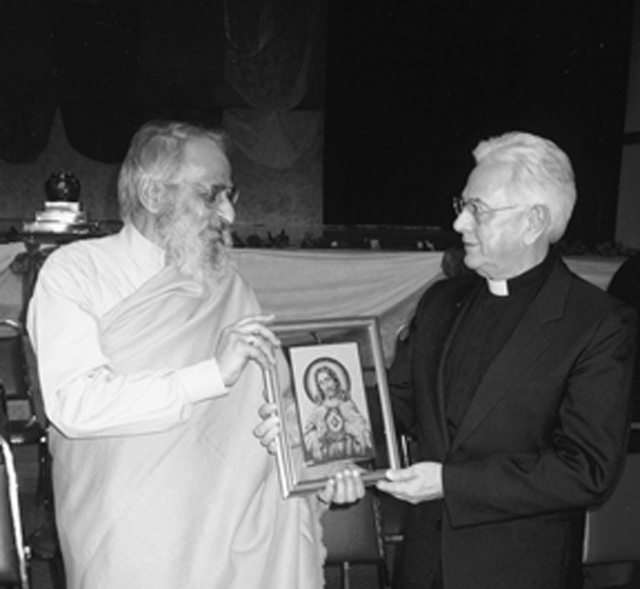 Swami Veda Bharati and Fr. Ray O’Toole, coordinator of Scarboro Missions Interfaith Desk
Swami Veda Bharati and Fr. Ray O’Toole, coordinator of Scarboro Missions Interfaith DeskScarboro Missions honoured
This spring, Swami Veda Bharati, an internationally renowned Hindu teacher from India, honoured Scarboro Missions for its interfaith initiatives. The presentation took place at the Vedic Cultural Centre, a Hindu temple in Markham, Ontario.
The program opened with a Hindu prayer service featuring prayers, songs, rituals and chants. Next, representatives of nine religions shared prayers of unity from their respective traditions. Swami Veda Bharati then presented a gold etching of Jesus to Fr. Ray O’Toole, coordinator of Scarboro Missions’ Interfaith Desk.
The day closed with an enlightening interfaith address by the swami. His talk was entitled, “Unifying Streams in Religion”.
Howard Bernstein, who has just completed his doctorate in religious studies, said that nonviolence is not a commonly used term in Judaism. However, the Torah (Jewish scriptures) commands us to practice righteousness, holiness, compassion and kindness toward all people and animals. The Jewish prophets advise us not only to abstain from violence but also to pursue peace. The expectation of a future messianic age of universal peace is a basic Jewish belief.
Guru Fatha Singh Khalsa, a Sikh minister and yoga teacher, stated that the essential Sikh teaching with respect to nonviolence involves an effort to overcome fear in one’s own life and to avoid creating fear in other people’s lives.
The New Testament advises us not to raise the sword against another person, and so Christians join the struggle for nonviolence. This was the suggestion of
Dr. Rosana Pellizzari, a Catholic. After her opening remarks, Pellizzari picked up her guitar and asked the audience to join her in singing St. Francis’ great prayer for peace.
She reflected on one line from this famous prayer: “To be understood as to understand, to be loved as to love with all my soul.” If you want people to understand you, Pellizzari contends, you have to understand them first. And if you want love, you must move beyond hatred and share your love and forgiveness.
Atiya Ashan, vice-president of the Canadian Council of Muslim Women, expressed a concern that political power often leads to violence. She is further troubled by the fact that the misuse of power by religious leaders can also result in violence.
The Muslim understanding of nonviolence, Ashan explained, has a lot to do with the Muslim understanding of God—there is only one God, a God who is not vindictive. Human beings are equal irrespective of their faith traditions, Ashan said. Tolerance, peace and equality are key Islamic values. She quoted the Qur’an (chapter 2, verse 177) to demonstrate that social justice, integrity and charitable giving are examples of Muslim values that amount to faith in action.
The Venerable Bhikshuni Tenzin Kalsang is a Buddhist nun and senior teacher at Tengye Ling Tibetan Buddhist Temple in Toronto. She reminded the audience that the Buddhist religion is rooted firmly in nonviolence and in this respect it is quite similar to Jainism.
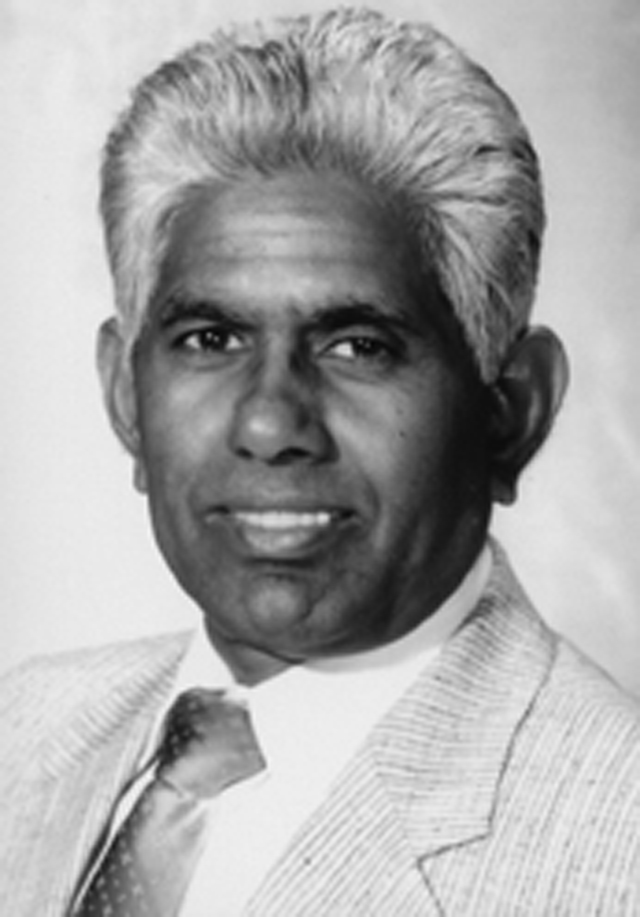 Deo Kernahan
Deo KernahanLast year, Deo Kernahan and Paul McKenna of the Scarboro Missions Interfaith Desk were likewise honoured for their multifaith efforts. Both were given awards by Horizon Interfaith Council, a Toronto organization that promotes interfaith dialogue by way of cable TV programs.
Deo, a member of the Hindu faith, is a founding member of the Scarboro Interfaith Desk. With 30 years of interfaith experience, Deo has been key to the success of Scarboro’s work. Paul has animated a number of the Scarboro events including world religions retreat days for high school audiences.
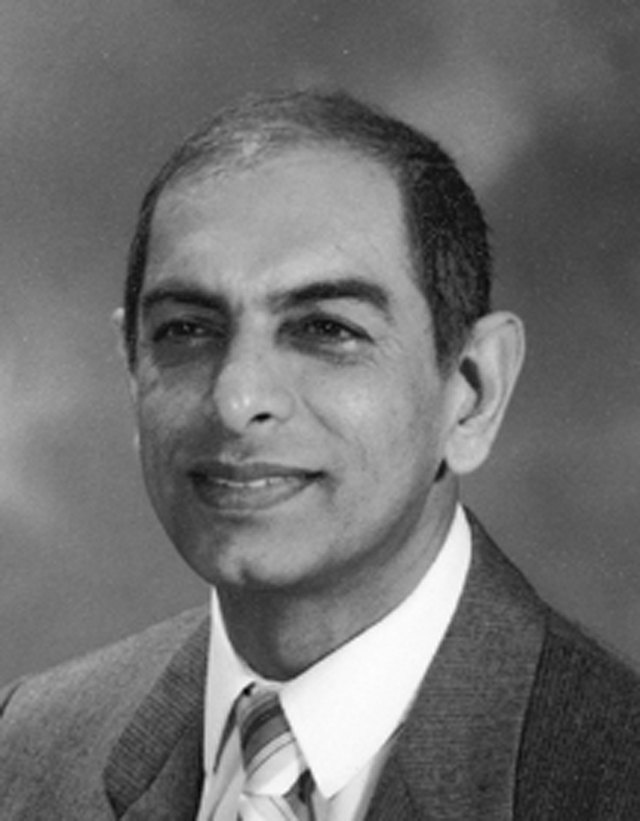 Ahmed Motiar
Ahmed MotiarA Muslim responds to the Holy Father
“BY DIALOGUE WE LET GOD BE PRESENT IN OUR MIDST,
FOR AS WE OPEN OURSELVES TO ONE ANOTHER,
WE OPEN OURSELVES TO GOD.”
(Pope John Paul II, Madras, India, 1986)
Scarboro Missions invited Ahmed Motiar (inset) from Toronto’s Muslim community to share his response to the Pope’s statement above. Ahmed, a teacher, writer and literacy consultant, is active in a Canada-wide organization known as the Muslim-Christian Liaison Committee:
“I find it interesting that this interfaith statement by John Paul was made in India, a country which has been multifaith for centuries. In Islam, a Muslim is reminded that no act of piety can bring one nearer to God than the act of striving to come closer to our fellow human beings.
Dialogue offers us the best means to understand the concerns, needs and problems of others. Muslims believe that we have a responsibility to address these needs and concerns by eliminating injustice and oppression. Only in so doing are we honoured by God’s Mercy and Presence. In terms of dialogue with other faiths, Muslims are committed to seeking cooperation for purposes of promoting mutual tolerance and better understanding.
The Pope’s recent visit to a mosque in Syria is certainly a step in that direction. Here is what John Paul said to the Muslim community in Damascus: ‘A better mutual understanding will lead to a new way of presenting our religions, not in opposition, but in partnership for the good of the whole human family.”
Chander Khanna of the Vedic Cultural Centre (Hindu) denounced the violence in India. He referred specifically to the assassination of Mahatma Gandhi and to the killing of large numbers of people during the 1947 partition. India, Khanna said, must take more seriously the ancient traditions of nonviolence that are found in many of that country’s religions.
The last speaker, Irena Upenieks of the Jain community, outlined the history of Jainism and its longstanding tradition of uncompromising commitment to the principle of nonviolence (ahimsa).
The panelists’ comments sparked an intense reaction in the multifaith audience including some despair about the current and continuing levels of violence in our world. On the other hand, many in the audience felt that interfaith dialogue is one important path to peace. This latter view reflects a development on an international level—for the first time in history, the religions of the world are beginning to work together for peace.
The program ended with a walking tour of the temple. Members of the Jain congregation explained the meaning of sacred symbols, statues, sacred writings and other objects in the temple area.
Nancy Dinnigan-Prashad of the Baha’i community functioned as moderator for the afternoon program. Following the event, she shared with Scarboro Missions magazine the Baha’i stance on nonviolence: “Human beings are given the responsibility to nourish and protect the planet’s ecological systems, all of which are interconnected. Likewise, we must recognize our human interconnectedness.”
Dinnigan-Prashad elaborated further on the Baha’i perspective: “We can overcome past conflicts and mistakes that have led to violence when we realize and accept that we are one family, both spiritually and biologically.”
The above article was adapted from an article written by Prakash Mody for the Ontario Multifaith News and Information on Spiritual and Religious Care. Prakash is the multifaith representative for the Jain community in Ontario. He worked closely with Scarboro Missions in organizing the interfaith gathering at the Jain temple.
Return to Table of Contents
Print Article
